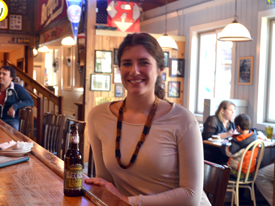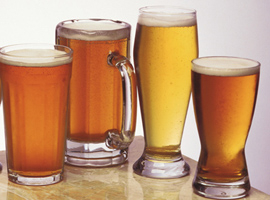No beer shots at these meetings

When the Rutgers Beer Appreciation Society holds its weekly meeting in the student center, it’s no keg party.
Members are more likely to discuss the Bavarian Purity Law of 1516, which governed how beer is made, than chug Budweiser.
“Some people come thinking they’re going to be getting drunk, but we change their minds by showing them we take it seriously. We’re not just throwing back beer,’’ says co-founder Keenan Witty, a senior English major.
In other words, it’s like a wine tasting club, only with stout instead of chardonnay.
The society teaches members to be discerning about beer, along with lessons about the brewing process. “I learned all my beer facts here,’’ says Witty. “To say that it’s educational is a complete understatement. Every person that walks out says ‘I learned so much about beer."
For a list of the Keenan's top picks, click here.
At meetings, many members discover that no matter how much they love beer, they know barely anything about it. Even when it comes to their own drinking habits, they have the brewski equivalent of illiteracy.
"Most people have a preconceived notion about what beer is. Until you try many styles, you can't be sure of what you like. People think they only like dark beer, for instance, but even within a certain type, beer comes in a variety of tastes,'' explains Witty. "With ales and lagers for example, the difference is mainly the fermentation process and not the flavor.''
At society meetings, members, who must be at least 21, pay $5 to sample different brands of the same brew type, such as cream ales or wheat beers. Sometimes, they’ll nibble on dried fruit to help them identify which flavors are in the beer.
They don’t consume more than six ounces per meeting and although, like other student organizations, the club is funded through the university, Rutgers doesn’t buy the alcohol. It pays for other items, like tablecloths and meeting snacks. Often, visiting brewery owners provide beer samples and lead discussions.
Professor Lena Brattsten, the club’s faculty adviser, thinks the Beer Appreciation Society shows students that indiscriminate guzzling is not the way to enjoy beer.

“The big problem for young Americans is that they completely lack information or education about how touse alcoholic beverages,’’ says Brattsten, an entomology instructor who teaches a wine course. “We don’t let anybody drive a car without first being educated; the same should apply to beer, wine and other alcoholic drinks. I support students who are older than 21 and want to drink beers other than Miller Lite.’’
Last year, there were about 25 society members, according to Witty. But since there’s no pressure to attend meetings, some only drop in sporadically.
“The great thing about beer is, you don’t have to learn about it in chronological order, because there isn't one,’’ says Witty. “You don’t have to know learn about pale ales to move on to IPAs. You can skip a meeting at any time.''
After a year in the beer club, Witty’s tastes in beer have changed dramatically.
Like many drinkers, she used to think Guinness was a heavy beer, but after downing heartier brews, she was startled when she drank some recently. “It felt like I was almost drinking water,’’ she marvels.
Although Witty used to hate stouts -- “They have a coffee-infused flavor and it’s not my style,’’ she says--the society exposed her to a few she enjoys.
“One thing we want to do is help people find what they like,’’ says Witty.
The society is also a way for students to meet people they might never have met otherwise. Beer is the common denominator. "The club made us all come together,'' she says. "I got to know people that I probably never would have run into anywhere else.''
Witty is glad that Rutgers sees the value in a supporting a group like the Beer Appreciation Society.
“I respect that the university has come so far in its thinking that this is something they want to have here,’’ she says
If students are going to drink beer, they might as well get gain some knowledge while they’re at it, says Witty. “Everyone loves beer, so while we’re getting an academic education, why not learn about this, too?’’